-
No Comments











Name: Houstin Levi Gossett Date: August 19th, 1992 – November 6th, 2010 Obituary: Mr. Houstin Levi Gossett, age 18, of 419 F Street, Thomaston, died Saturday, November 6th. Funeral services will be held Tuesday, November 9th at 4:00 PM, in the Pasley-Fletcher Funeral Home Chapel with Rev. Dean Hemphill officiating. Burial will follow in the Crystal Hill Cemetery. His family will receive friends at Pasley-Fletcher from 6 to 8 PM Monday evening. Houstin was born in Thomaston, attended Upson-Lee Highschool and later earned a GED from Flint River Technical College. He is predeceased by his father, Robert Levi Gossett and grandfather, James Melvin Gossett. He is survived by his mother, Terri Gossett Johnson of Thomaston: grandparents, Wanda and Steve Epps of Yatesville, and Mildred and Duke Garrett of Thomaston; a sister, Jasmine Alexis Johnson, of Thomaston; uncles, Jerry (Linda) Gossett and James (Maria) Gossett, both of Yatesville; aunts, Tammy Hall and Toni (Chris) McDaniel both of Thomaston. In lieu of flowers, memorial contributions may be made to the Houstin Levi Gossett Fund at West Central Georgia Bank. Pasley-Fletcher Funeral Home is in charge of arrangements. college Memorials: In liew of flowers, memorial donations may be made to the Houstin Levi Gossett Fund at West Central Georgia Bank Visitations: 6:00PM to 8:00PM on Monday, November 8th, 2010 at Pasley-Fletcher Funeral Home (map/driving directions) Services: 4:00PM at Pasley-Fletcher Funeral Home Chapel on Tuesday, November 9th, 2010 (map/driving directions) Cemetery: Crystal Hill Cemetery
321 Hannahs Mill Rd
Thomaston, GA 30286 (map/driving directions) -
1 Comment
Grandson of Samuel Huey Epps
As long as I can remember I was called “Tiss” by my cousin Johnny. He had a tiny speech impediment. As kids growing up he would entertain us with his adventures . He told us tall tales and had us believing every one of them. He was the “story teller” of the family. He did not lie he would just make up stories and make us think they were the gospel. Like the time he bought a pair of those xray glasses out of the back of an old detective magazine. When we would come in the room he would say he could see us without any clothes on. He would sit there and grin. I was horrified. I asked once if I could see them and he said no that they were specially made to the specifications of his eyes and only they would work on him. I would come in the room covering my body parts with my hands the best I could so he would not see me!
In the first grade we went to the hospital together to have out tonsils out. I would cry when it was time to get a shot and he would say “Dont cry Tiss, It only will hurt 15 minutes.” Somehow that made it better.
Johnny had the best collection ever of comic books. I spent many times reading the Adventure of Archie, Veronica and Jughead and then see what Superman was up to. Aunt Margaret did not know what comic books were worth later on and I must say I am sorry to say that she had a cleaning out of the house and they went to the garbage. He kept them in the dining room in the bottom of an old china cabinet she had. She probably threw away “most a million dollars.”
He had a monkey. So Michael Jackson, you had nothing on him. He wanted a horse and Big Daddy bought him a horse. He and I got a baby chicken one Easter. Mine did not live to long and his lived and was one old mean rooster named Chickadee. You would get out of the car and be walking to the porch at Big Mama and Big Daddy’s house where Johnny lived with his mother and daddy, and that chicken would come out of nowhere and jump up on your back and peck the devil out of you. I hated that thing. I am not sure whatever happened to Chickadee. Do you eat roosters? Aunt Margaret made some great friend chicken and a washtub full of her famous potato salad.
In the 50’s we made out TV debut. Aunt Margaret took up to WTBS in Atlanta to be on the Popeye Club with Officer Don. Gosh we had a blast. I remember us looking up and seeing the glass box type room where the parents were sitting watching below at the children. We dreamed about being movie stars and we thought since we had been on TV we were.
Johnny was the most awesome baseball player. He would play ball at the “Y” in Piedmont. When he came up to bat they just stood there and did nothing, just watched. Pitcher would pitch the ball and he would knock it out of sight. You would hear the bat cracking , the crowd hollering and all of us cupping our hands over our eyes to keep the ballpark lights out of the way so we could watch it dissappear. I know in the Mill Village , where the workers at the Standard Coosa Thatcher cotton mill lived, there had to be many houses with the metal roofs dented. He could knock a baseball several blocks away. Up in the air and out of site. He got a letter from the Braves in Atlanta in the 60’s I think it probably was stating they would like to talk to him about playing for the Braves when he graduated. He quit school at 16 and went to work. There went the baseball dream.
Then in 1960 he and I were in a Tom Thumb Wedding. We felt like royalty all dressed up in bridesmaid dresses and him in a suit.
His birthday was today. This is the first time in a very long time that I did not buy a Halloween birthday card to mail to him. If I had I would have had to sent it to Heaven. Johnny is not even thinking about his birthday today. He is having a far more better time. I do miss him and I love him. Happy Birthday Johnny! October 28, 1953-December 16, 2009.
Love, Tiss
That is Johnny standing next to me while I am blowing out the candles on a cake.
We sure were enjoying Big Daddy’s old rocker.
Mother getting ready to cut the cake and Johnny surely giving it the eye.. He wanted some cake!
We were so cute.. Our clothes almost matched.
I bet he is thinking about those glasses he is going to get in the future! Look at that little devilish look on his face.
Chris and Johnny in the Tom Thumb Wedding.
This is Johnny. I was on the day we buried his mother’s ashes.
-
No Comments
Yesterday my web master forwarded an email to me that came to her off this site. I read it and found it very interesting. I emailed the author of the story and asked him could I use this story on this blog and he said I sure could.
I hope you enjoy this story. It was written by Mr. Elton Camp. You may read more stories by Mr. Camp here http://www.scribd.com/Elton45623287
The Scattering
Viola Hyatt, the Alabama Axe Murderess
By
Elton Camp
(Note: This is a partly fictionalized account of actual murders that took place in Alabama about fifty years ago. I changed the names of the victims since I’m unsure if they have living descendents and don’t want to embarrass anyone. Viola Hyatt is dead and left no descendents. Since nobody else is depicted in an unfavorable light, the actual names appear. There seems no reason to detract from their “fifteen minutes of fame” generated by the notorious case. Much of it follows what was widely reported to have occurred, but several portions are fabricated and only speculation on my part. Part of the dialogue is actual, but some is added for dramatic effect and interest. This story, as you can surmise from its title, is violent, gruesome and unfit to be read by children. It’s something that occurred a short distance from where I attended undergraduate school and I remember it well.)
Almost all babies are cute, but even as an infant, Viola Hyatt wasn’t. A chubby, red-faced, fussy baby, she grew into an obese youngster whose features, even charitably, could only be described as plain. Her long, black hair was coarse and resisted attempts to keep it groomed. Her skin, studded with moles and blemishes, was equally unattractive. Clear, blue eyes were her best feature, but they were marred by frequent redness due to infected lids.
Her family was desperately poor. Mr. Hyatt eked out a living as a hog farmer on a small spot of inherited land near the community of White Plains in east central Alabama. Their house, a shack of four rooms, was unpainted. Its left wall was noticeably off of vertical and the roof sagged in the center. Most would have been afraid to live there, but the Hyatts had no choice. Ironically, locals called the community “the Garden Spot of the World.”
Stranded on an isolated farm, Viola had little chance to interact with other children, but when she did, her sullen demeanor and sudden outbursts of explosive rage caused her to be disliked.
“Viola’s mean and ugly,” a girl her age said in a mocking voice to the other children at a family gathering. “It’s no wonder nobody likes her or wants to play with her.” The others added their own disparaging remarks. They didn’t care that Viola was hearing every word. The taunts were like stabs into her heart, but she maintained a stoic expression and made no reply.
The two-dozen pigs her family kept in an enclosure between the house and barn only added to the misery. Especially in the hottest days of summer, they produced a stench that could be tasted as well as smelled. Viola hated the hogs, both for their odious odor, and for the hard work required in feeding and cleaning up after them. Yet, the income they generated was essential to the family’s survival.
“When’s it going to be time to kill hogs?” she demanded of her father as soon as they began to approach market size. “I want to watch when you do it and if you’ll let me, I’ll help with it.”
“It’ll be a while yet and you can’t do nothing. That’s not a fit work for a girl your age,” he responded. “You’re only in the seventh grade. Go on in the house and help your mother cook supper.”
Mrs. Hyatt was a slightly built woman, entirely different from her daughter in appearance. Her long, blond hair was silken; she spent an hour each evening carefully brushing it. She had fair skin and pleasing facial features. In her youth, she had been a beauty, but penury and sickness had taken their toll. She coughed deeply even as she lit yet another cigarette. The woman bitterly resented her lot in life.
“I don’t know why God is punishing me by sending me a husband like your paw and girl like you,” she complained to her daughter. “I ain’t done nothing to deserve it, far as I can see. He can’t make a proper living and you’re ugly as hell. When I think of the men I might have married, it just makes me sick to my stomach. Some day you’re going to come home from school and find me gone. I don’t know why I’ve put up with the two of you as long as I have. There’s plenty of men with money that’d be glad to have me.”
Viola had heard it all before, over and over. When she was younger, she often cried herself to sleep at night because of her mother’s cruel words, but she had no more tears to shed. A consuming hatred filled her soul.
“I don’t care if you leave. I hope you die!” the child spit out as she ran out of the room and slammed the door behind her. Two years later, Viola’s wish was suddenly fulfilled.
Mr. Hyatt was ill prepared to function as a single parent to an adolescent girl, but he did the best he could. Over time, Viola learned to cook reasonably well and to keep the house as clean as its condition permitted. He continued to refuse to allow her to help process the hogs.
“You’ve seen how I do hit,” he said. “Most don’t cut them up with an axe like I do, but that’s the way my father learned me. It’s no work for a girl, even one as big and strong as you’ve got.”
The tall, powerfully built Viola, due to strenuous farm work in addition to household chores, had developed considerable strength, especially in her arms and hands. Over the years, her dislike of the hogs had only grown.
“Things like them don’t deserve to live,” she told her father. “The dirty, stinking varmints lay around and expect to be waited on and fed. Sometimes they even bite me when I pour their slop into the trough. I’m glad when they finally have to pay for their keep.”
That fall, she sat at the grindstone sharpening her father’s axe. Sparks flew as the rough stone honed the blade. She felt the edge with satisfaction at a job well done. It was razor-sharp and ready for use. Viola imagined, with pleasure, the hard steel slicing through the warm flesh of the hogs.
Saturday morning, Mr. Hyatt was jerked awake by a loud squeal followed by silence. “Something’s bothering the hogs,” he thought. Customers would be expecting their usual meat deliveries soon, so he got up to investigate. When he reached the hog pen, he made an astonishing discovery.
The largest hog lay on its side in a pool of blood, its head almost severed from its body. Viola, covered with gore, had forced another animal into a corner of the pen and was already swinging the axe downward with violent fury. The hog died instantly.
“Daughter, what are you doing?” he demanded. “I told you I’d take care of butchering the hogs.” She turned to face him, with a strange look. Blood dripped from her face and ran down her dress to its hem.
“You’re getting old, Paw. It’s time you had some help,” was all she said.
After that, Viola not only killed the hogs, but also chopped them into salable parts. She learned quickly and did expert work so that he no longer objected when hog killing time came around. By the time she was eighteen, she did all the butchering. He only had to market the pork.
Ready to take advantage of an opportunity to increase his income, Mr. Hyatt made what he considered to be a cagey deal with two men. Brothers in their forties, they worked with the construction company building the new road to Jacksonville.
“Since we live at Rabbittville, we need a place to park our trailer for a couple of years,” Rufus, who was the older of the two, explained. “We’ll pay you rent for a space and if your daughter wants to cook for us, that’ll be extra money. My brother, Randall, and me will split the cost so it’ll work out good for you and for us.”
The deal was made and the men moved the small trailer to a level spot about fifty feet behind the Hyatt house. The extra money was a windfall for the father and daughter, although it greatly increased her workload. Viola was strong and didn’t object. Rufus and Randall, however, had in mind a modification to its terms. “Viola ain’t very good looking,” Randall remarked, “but she’s better than nothing.” Rufus winked in agreement.
“You can meet us one at a time at the barn or take us both on at once here in the trailer,” the two informed Viola. “Of course, there’ll be a little something extra in it for you.” Over the following weeks, the two gradually began to treat her with contempt and to criticize everything she did.
“You’re lucky we have anything to do with an ugly old thing like you,” Rufus sneered. “Really, you ought to be paying us.” Randall smirked in agreement.
When her father comprehended the situation, he reacted with outrage. “You men leave my daughter alone,” he ordered. “I didn’t agree to nothing like this.”
“Don’t try to tell us what to do you old billy goat,” Rufus replied. He struck the elderly man a stunning blow to his midsection and followed it with a fist to his jaw. He dropped to the ground, moaning in pain. Viola watched from a distance, an angry scowl on her face. For some months, Viola silently submitted to their verbal and physical abuse, but with growing rage.
The brothers became particularly mean when they were drinking which was often. “Be down at the barn in about ten minutes,” Rufus ordered with a drunken slur to his voice after he had wolfed down the supper Viola had prepared. “We got a busy day tomorrow and need to get to bed early. Randall will be down afterwards. Hurry up there, woman.”
Viola complied with their demands once again. Afterward, she had a simple request. “I’ll need to use your car Saturday to go to the grocery store. Our old truck won’t start.”
“Hell no, you ain’t using it,” Rufus stormed. “The more we do for you, the more you expect. You can hoof it or hitch your way into town.”
Viola had had all she was going to take. Early the next morning, June 27, 1959, she loaded her father’s shotgun, walked to the trailer, and knocked loudly. “Get up you two bastards. I have something to settle with you.”
“What do you mean waking us up this early?” Rufus demanded as he opened the door and stared out groggily. “Get gone and call us when you have breakfast ready.”
Suddenly, the man spotted the leveled shotgun. He yelled in fear, “What do you think you’re doing, Viola! Randall, get in here. We got trouble.” He slammed the trailer door and locked it. Seconds later, a blast from the weapon ripped several holes through the flimsy barrier. Viola jerked it open and blasted Rufus full in the face as he backed away in abject terror. Randall emerged from the bedroom to receive a similar shot to his face. Both men lay dead, pools of blood rapidly expanding on the floor.
Calmly and deliberately, Viola took the car keys from an end table beside the couch. After returning the shotgun to the rack in her living room, she cranked the 1957 Ford Galaxy and drove it as close to the trailer door as the rough terrain would allow. After raising the trunk lid, she dragged Randall into the yard, but found it too difficult to heft his limp body into the car’s trunk. Viola knew just what to do. She went to the barn, selected a double-edged axe, clunked it into a metal wheelbarrow, and rolled it alongside the man. With powerful strokes, she severed his arms and legs. It was then easier to load him into the wheelbarrow for transport to the waiting vehicle. His brother met a similar fate.
“Paw, go back into the house,” she ordered when she saw her father, aroused by the gunshots, appear on the back porch. “I’ll take care of this.” Shaken, but not knowing what else to do, he meekly obeyed.
Viola used the phone in the mens’ trailer to call the Ace Construction Company. “Rufus and Randall told me to call them in sick. They both came down with something and won’t be at work for around a week.”
She slammed the trunk and then hurriedly buried the bloody axe in a field a few yards from the trailer. The essentials cared for, Viola quietly made her way to a spot concealed in the midst of a cluster of pine trees. Standing alongside a small, rectangular pile of dirt with a fieldstone at each end, she whispered, “I made them pay for what they did to you, just like I promised when I put you here.”
With the protection provided by nightfall, she proceeded to carry out a plan she had worked out in her mind.
Easing away in the sedan so as not to draw attention, she commenced a nightlong drive from White Plains toward Gadsden, eventually passing through three counties, Calhoun, Etowah, and Cleburne. She threw out two legs in some brush beside a road in Etowah County. Viola drove through the Talladega National Forest into Cleburne County and tossed two legs into the Tallapoosa River. An arm she slung into a roadside tangle of briars where a horrified blackberry picker found it. Later, another arm was found about a mile away, several miles from where the legs were found. Miss Hyatt told authorities that she discarded two arms on Sadler Mountain near Piedmont, Alabama although they were never located. O.T. Holladay found one torso on June 28th in a dirt driveway alongside an abandoned shack just off Hwy 11 near Attalla. The other was discovered about ten miles away by a rural housewife in the woods near her house on June 29th. The entire area was thrown into panic as all speculated as to what kind of deranged man could do such a thing. For the first time, people began to keep their house doors locked.
Police, unable to identify the battered remains, named them Mr. X and Mr. Y. When the bodies were delivered to a funeral home in Gadsden, the owner balked. “You can’t bring something in such bad shape inside. Nobody’s ever gonna want to use this place again.”
When the state toxocologist arrived, he finally agreed to perform the autopsies in the parking lot despite the blazing summer temperature and scorching sun. The chief of police, who had furnished security, gratefully treated the man to a spaghetti meal at locally popular Tony’s Place. “Not eating, chief?” the official asked as he cut a meatball in half and popped it into his mouth. The man made a halfhearted reply and pushed the food around on his plate as he tried to drive from his mind the horrific images and odors of the day.
“There’s not a lot to go on,” commented the sketch artist as he attempted to create what he thought the men looked like based on photographs. The resulting line drawings were distributed across north Alabama. The bodies were buried and then dug up a few days later when no progress was being made on the case. For seventeen days, the police were stymied with dozens of tips and fruitless leads.
“Look at this,” the sheriff said to one of his deputies. “Ace Construction says two of their men have disappeared and can’t be located. Here’s where they were living.” Sirens sounding and light flashing, they rushed to the Hyatt farm on a moonless night. The search for evidence continued all night and into the next day.
That Viola’s role would be uncovered was inevitable. Her incriminating phone call, blood and hair in the trunk of the mens’ car, the damaged trailer door, and bloodstains in and in front of the trailer showed her guilt. Discovery of the axe under recently disturbed dirt removed any doubt. All were shocked that a woman could commit such a heinous crime.
Authorities initially took both Viola and her father into custody, but soon released him when it became clear that he had nothing to do with the murder. They questioned her for six hours before she broke down and began to relate what happened.
At the behest of her court-appointed attorneys, R.A. Norred and John Phillips, she was transferred from Calhoun County Jail in Anniston to Brice Mental Hospital in Tuscaloosa for evaluation to determine sanity. They explained, “She appears to be unable to understand the nature of the charge and proceedings to be had against her and she appears to be unable to cooperate and assist in preparation of her defense.”
Circuit Solicitor R. Clarence Williams didn’t object to the procedure, so Circuit Judge Leslie Longshore ordered the examination. Dr. J.S. Tarwater, director of Brice, replied to a reporter’s phone call, “She was admitted just before noon and will probably stay three weeks to a month.” He was overly optimistic. After five months examination, the mental hospital returned her to Anniston with the finding that she was presently sane and they believed she was sane at the time of the murders.
“Here she is,” shouted a reporter as the sheriff’s cruiser pulled in front of the jail. Viola emerged on the crisp fall day, wearing a blue coat that extended below her dress. Although her hair was unkept and she wore no makeup, she paused, a half smile on her face, and turned toward photographers as flashbulbs went off in rapid succession. “Viola, how’d you like Brice?” a newsman called out. “The food wasn’t bad, but too many crazy people there,” she quipped. “How about you, Viola? Are you crazy?” he returned. “They say I’m not, but I could have told them that without spending all that time and money,” she retorted with a grin. Over the next few days, she agreed to a number of interviews, including one with a minister who came to offer spiritual aid.
Her attorney commented, “She’s willing to talk to anybody but us.” Norred rightly complained, “It’s the first time I’ve had a client who won’t tell me what happened. I’ve had them lie to me before, but, but she talks until I ask her the facts about what happened then she won’t talk.” When he attempted to interview her immediately after he was appointed, she wouldn’t sit down and stood for two hours. “How are you going to justify a killing when your client won’t give a reason?” Norred added in exasperation. “All she would say was that she had the best reason in the world. I never did learn what that reason was. She didn’t deny that sexual abuse was involved, but she indicated that was not the main reason. She said it was worse than that.” The attorneys had little option but to base the case on a challenge of the sanity ruling and lined up witnesses. Viola wouldn’t agree to an examination by an independent psychiatrist.
Trial was set in March term of circuit court. People commenced to gather at the courthouse over an hour before the proceedings were to begin. Soon all the seats in the courtroom and its balcony were filled and people stood around the walls and in the back. “I’ve never seen a crowd like that,” a guard reported to Judge Longshore. “It’s got to be against fire regulations.” The judge replied, “Don’t let any more come inside. They’ll have to wait downstairs in the lobby or just go home. Tell them I said so.”
A roar of excitement arouse from the spectators as they caught sight of Viola being escorted across a skywalk from the jail to the courtroom. Several reporters leaped to their feet and called out as they pointed cameras in her direction. Viola looked straight ahead and seemed not to notice them as she entered and made her way to the defense table where she seated herself between her attorneys. She wore a charcoal dress, gold colored earrings, red high heel shoes, hose with seams, and far too much bright red lipstick. In her right hand, she held an unopened pack of Camel cigarettes. Her 72-year-old father, in dress trousers and a long sleeve white shirt, sat near the bench with his head down and appeared calm. She looked in his direction, but said nothing.
Jury selection proceeded at a slow pace, interrupted at intervals by groans and catcalls from the spectators. “Any more of that and I’ll order the courtroom cleared,” the judge declared with a sharp rap of his gavel. The crowd remained quiet. They’d come for a spectacle and didn’t intend to miss out on it.
After the jury of twelve, all males, was selected, the judge ordered a recess that continued for an hour before the judge reconvened the court and announced that an agreement had been reached in the case. The spectators moaned in surprise and disappointment. They had wanted to hear the gory details of the case discussed and hoped that Viola herself might testify. The judge ignored the disturbance. The woman had changed her plea to guilty. The State was willing to settle for a life sentence so the attorneys accepted the offer to eliminate the possibility of the electric chair. She, however, made the final decision. “We had hinted around at the possibility of an agreement for some time,” one of her attorneys later recalled. About two weeks before the trial date, they asked her if she would accept it if they could get her life and she agreed.
When she told her father she intended to accept the deal, he “guessed that it was the best thing to do,” Norred said. The attorneys felt that her having cut up the bodies would have had a strong effect on the jurors. “If we were just concerned with the shooting, there would have been some danger as far as the State was concerned,” Norred added.
As Viola left the courtroom to return to her cell, she stopped and spoke quietly to her father. When she moved on, a reporter asked Hyatt if he felt the deal was the right thing to do. “They told me not to tell nothing,” he replied sharply, “So you can go your way and I’ll go mine.”
“I never would have believed that Viola could do such a thing,” a relative avowed. She never had much to say and always did what she was told. She went to church regular and was a hard worker.”
A chant about an earlier axe murderess, Lizzie Borden, was revised and used for a short time.
Viola Hyatt took an axe
And gave her lover forty whacks.
When she saw what she had done,
She gave his brother forty-one.
Will the full details of what happened ever be known? Attorney John Phillips speculated, “Unless she changes, she will take it to the grave with her.” So it proved to be.
On April 15, 1970, after decades at Julia Tutwiller Prison for Women, The State Pardons and Parole Board unanimously voted to parole Viola. She returned to her family’s farm where she lived quietly and in isolation until her death in a hospital in nearby Jacksonville in 1992. She never discussed her experience, even with family, and refused to grant interviews.
-
No Comments
Miscellaneous Abraham Williams VanZandt from Mary Harrigan.
Abraham was first elected Sheriff of Delaware County on the Republican ticket 16 November 1863.
Death notice spells “Vanzant” When Mary was young the name was spelled Vanzant. After WWII her uncle decided it should be spelled VanZandt. Apparently there had been some research then and the name was changed back.
John of Clifton Heights who was the number 2 child of Abraham’s descendants still uses the Vanzant spelling.
Abraham’s family must have lived in Rockdate Aston area where John P. Crozier had mills. This was in the Chester or Upland, Pennsylvania area.
Family history says “Abraham set up Number 1 mill in Upland, Pennsylvania” The dates agree.
The first Upland Public Grammar School established 1853-1856 in house on N.S.Race Street next to Caleb P. House on the west commenced 4 May 1853. A.Williams, Instructor.
March 1854 Abraham Rowland Vanzant, Jane, Eliza, Louisa, Emeline were students during May, June, July, August went to Carterville School, Chester Twp before 1854 P. 139 April 1861. Rowland’s last day in school. In 1858 Emeline and Louisa Vanzant moved away. Said to be good scholars.
In about 1858-9, Abraham went to Roswell GA as a manager of a mill. He returned to Chester, PA in 1861 because of his union principles.
1863 Abraham was elected Sheriff of Delaware County, PA for 2 years. Delaware Co. Republican notes V 39 page 16, 118, 120 , then manager of Osborn Levis Mills, Upper Darby PA.. Many years he was very prosperious.
1876 Last public appearance, at the Declaration of Independence at Flag Raising Centennial Celebration
1888 Accessor 28th Ward at the time of his death. He died of pneumonia.
He was a member of Leiperville Lodge I.O.O.F. Harrisburg, Pennsylvania. All records was lost in the flood Agnes 1972.
Lay preacher Methodist Church. Superintendent of Sunday School in Avondale.
Abraham had been a member of Madison Streeet Methodist Church, in Chester, PA. All records there destroyed and words written “BAD BLOOD” across his name. Apparently Abraham got involved with a female church member.
Mary Ann Verlenden his wife is reported to have a violent temper.
Abraham was buried from son George Rice VanZandts home 8th and Church St, Upland, PA then from Church. Ministers from Upland Methodist and Trinith Methodist in attendance and members from the Lodge.
*** Later on in our research, it was determined Abraham was in deed bad blood. It was found that he was a bigamist****
Anyone has any information on Abraham Williams VanZandt please contact me at SadieMaesAttic@aol.com
-
No Comments

Today my most wanted person is
Thomas Cowan
Died August 6, 1891
Aged 63 years.
I believe this is the father of my Great Grandmother Margaret Jane Cowan Vanzant. She was born in Pennsylvania and died in Anniston, Alabama
-
No Comments
This was my Grandfather Samuel Huey Epps, brother. George was the son of Hiriam Thomas Epps and Martha Annie Chesser. He was born 3 February 1898 in Petersburg, Lincoln County, Tennessee and he died 1954 Delta , Clay County, Alabama.
When we would get in trouble at home Mother would call us George Epps. I found out later why. George had been in some serious trouble with the law. Here are clippings from the Annistonstar newspaper, Anniston, Alabama.
Anniston Star
March 17, 1936
Ernest Love of Maxwellborn, slain after argument with neighbor over money.
______________
George Epps is sought by county officers
______________
Told wife he was coming to Anniston to surrender – Wife tells deputies.
Ernest Love, farmer of the Maxwellborn Community in North Calhoun County was instantly killed at noon today by a charge from a shotgun at the home of George Epps, another farmer of the same community who is being sought by sheriff’s deputies.
The shooting climaxed an argument, according to information gained by investigating officers that arose over a money transaction.
The shotgun charge struck Love in the heart and death was instantaneous, it was reported.
Mrs. Epps and Paul Livingston were in the Epps home at the time of the shooting, but neither saw the gunfire, officers learned.
Livingston quoted Epps as saying “I’ve killed the best friend I have. I’m going to Anniston and give up.”
Deputies Arlan Williamson and J. Adkinson were summoned shortly after the shooting and could not find Epps. Epps had not given himself up when the Star went to press this afternoon.
The Epps home is located about a quarter of a mile south of Senator M.B. Wellborn’s home at Maxwellborn, and Love resided about a quarter of a mile North of the Wellborn place.
March 19, 1936 George Epps, charged with shooting Ernest Love at the formers home Tuesday.
————————————————————————————————
Anniston Star
June 14, 1936
Murder trial of George Epps set for Monday.
————————————————————————————————
June 14, 1936
Murder Trial of George Epps Set For Monday
Anniston Star
Former Anniston mill worker charged with killing Ernest love.
George Epps, of near Piedmont, former Anniston cotton mil worker, will go on trial in Calhoun County Circuit Court Monday on charges of murder in connection with the shotgun slaying of Ernest Love near Piedmont several weeks ago.
The shooting occurred at Epps home at Maxwellborn on the Piedmont Highway.
Love was instantly killed. Persons in the Epps home told investigating offiers that Epps exclaimed after the shot was fired, “I’ve killed my best friend.”
Epps was taken in custody by Deputy Arlan Williamson several hours after the shooting. He was located by the deputy at a negro’s house a mile or more from his home.
Epps refused to make a statement to arresting officers regarding the shooting, saying, “There is plenty of time to talk.”
————————————————————————————————
June 15, 1936
Murder Trial of George Epps Speeds To End.
__________________
Maxwellborn Man Charged With Fatal Shooting.
___________________
Vanderford Is First Witness For State.
_________________
Defendant’s Neighbors Take Stand In Effort To Save Man’s Life
________________
The prosecution, moving rapidly, rested after introducing only six witnesses in the murder trial of George Epps, former Anniston mill worker, in Calhoun Circuit Court early Monday afternoon. Epps if charged with the shotgun slaying of Ernest Love at the Epps home at Maxwellborn, March 17th.
First degree murder was charged in the indictment returned by the grand jury, a crime that carries the death penalty.
Y.B. Vanderford of Piedmont, deputy sheriff, was the first witness in the case. He testified about his findings at the Epps home in his investigation following the shooting.
Solicitor J.B. Sanford of Talladega was being assisted by Merrill, Jones and Whiteside in presecution of the case.
Epps was being defended by Charles Thomason, young Anniston Attorney.
Following Vanderford to the stand, was Charles Livingston, Chief of Jacksonville Police who was one of the investigating officers. Both the officers described the finding in the house when they were summoned following the shooting.
Three negroes and a physician concluded the states side of the case. George Keith, negro, testified that Epps offered to exchange clothes with him after the tine fixed for the shooting. LuLu and Joe Green testified that Epps came to their home and they fed him supper.
Dr. J.H. Woolf of Piedmont testified about the wound that caused Love’s death.
First witnesses for the defense were Joe & Early Livingston, Epps’ neighbors. They testified that Epps and Love were at the Livingston home a short time before the killing and that they apparently were on friendly terms.
Mrs. Orilla Mullins, half sister of Mrs. Epps testified that she was in the pasture at the time of the shooting and that she knew nothing about the occurrances before the shot was fired. Her tistimony dealt primarily with occurrances after the shooting.
Epps hearing was being conducted in Judge Lamar Fields section of the court.
———————————————————————————————–
June 16, 1936
Jury Gets Epps Murder Case In Circuit Court.
_______________________
State Does Not Ask Death Penalty In Maxwellborn Shooting.
______________________
Self Defense Claimed In Ernest Love Death.
_____________________
Witness Differs On Points In Testimony In Final Stage Of Trial.
____________________
George Epps today was convicted of First Degree Manslaughter in the death of Earnest Love and his sentence fixed at five years in the penitentiary. The jury was out for hours.
“Punishment that is just to the testimony” today was asked of the jury by prosecuting attorneys in the murder trial of George Epps in Calhoun Circuit Court shortly before the case was given over in the jury for deliveration.
Epps is charged with the shotgun slaying in Ernest Love at the Epps Home at the Maxwellborn last March. The case was opened Monday and the testimony was completed late in the afternoon. Arguments of Counsel were completed this morning and the jury took up the case after the charge by Judge Lamar Field.
Epps took the stand in his own defense and testified that he shot in self defense after Love came upon him with a knife.. He testified that Love started on him with a knife after an argument over a $14 debt Love sought to collect. Epps said Love started on him and that he backed away to a door over which was resting a shotgun. He said he got the gun and fired it once.
Argument preceded shooting Tall Livingston, neighbor, who was in the room at the time of the shooting, testified that an argument preeceded the final shot. Mrs. Epps also gave similiar testimony.
Mrs. Orilla Mullins, a defense witness, testified that she had seen Wallace Chapman close Love’s knife and that she also saw him look into Love’s purse. She is Mrs. Epps’ half sister and was near the house at the time of the shooting.
However, Lennie Herd, another defense witness, testified he was not at the Epps home when Chapman was there.
Refutes Testimony
In rebuttal testmony the prosecutions first witness was Wallace Chapman who said he did not touch Love’s purse or knife. Herd was a rebuttal witness for the prosecution and testified on that examination that he did not see Chapman bother the purse or knife. Testimony of investigating officers had shown that Love’s purse was empty when and examination of the body was made.
The prosecution contended that Love was seated in a chair when he was shot and that the charge from the shotgun ranged downward in his chest. Coke Love, a brother, testified that the deceased was six feet, one and half inches tall. Defense witnesses said that Love was standing up when the shot was fired.
It was brought out in the testimony that Epps owed $14 to Love for about three years; that the debt was contracted when they lived in the same house and farmed together.
————————————————————————————————
December 21, 1938
Parole Notice
Notice is hereby given that George Epps, who was convicted of first degree manslaughter in the Circuit Court of Calhoun County, Alabama on June 20, 1936, and sentenced to the state penitentiary for a term of five years, will make application for pardon or parole.
————————————————————————————————
Anniston Star
November 17, 1954
William G. Epps, 57, painter who had lived in Clay County for the last two years, died last night in a Clay County hospital following a lengthy illiness.
Funeral services will be held at the First Baptist Church of Piedmont with the Reverand Holland Thomas officiating; burial will be held in the Highland cemetery of Piedmont. The date and time of service will be announced by Owens Funeral Home of Piedmont.
Mr. Epps is survived by his wife, Mrs. Jessie Epps of Delta, Route 2. One daughter, Mrs. Ernest Knight of Miami, FL: two brothers, J.T. Epps of Anniston,and Sam Epps of Piedmont. One sister Mrs. May Armstrong of Gainesville, Florida.
-
No Comments
Do you always find yourself needing a form to document your information? Well you can go to http://www.familytreemagazine.com/ and they have forms to download for your use. I think this is a great idea and I thank them. This magazine is also packed full of other great ideas and suggestions.
-
40 Comments
Born February 3, 1929
Died June 12, 2000
Occupation: Alabama Ax Murderer.
Viola was Calhoun County, Alabama’s most infamous resident.
Virginia Viola Hyatt know by Viola was from the White Plains, Alabama area more commonly known as Rabbittown. Her mother died when she was a young child and she was raised alone by her father, Martin Hyatt until he married her stepmother, Jessie Wheeler. Jessie terrifed of Viola. She died the day Viola was scheduled to be released from prison.
June 28,1959 Emmett and Lee Harper met their maker.
The death certificates states June 28th, 1959 as their death date. Other records state the 27th.
Emmett and Lee were tenants at the Hyatt home living in a small trailer in the back of the property. The story goes that they were sexually abusing her and physical abusing her father and argued over the use of their car.
She confessed to the authorities that she shot the men in the face with a double barreled shotgun as they stood in the doorway of their trailer. Then she stated that she hung the bodies up on the door of the shed and dismembered them with a double bladed ax. It was also told by Hyatt that she then took the parts of the bodies, loaded them up in the family car and headed to different counties in Alabama and threw the body parts out of the car windows as she drove.
Viola spent several months, possibly 5 or 6, at Bryce Hospital in Tuscaloosa, Alabama under mental observation. Then she pled guilty and served 10 years of a life sentence.
In prison she was a model prisoner. Gave them no trouble and was the seamstress for either the Warden’s wife or Governor of Alabama wife. I will have to dig out my many boxes of information.
Question has always been on the minds of others as maybe she was a victim of sexual abuse as a child, if she had produced children and they died or were killed and fed to the hogs and if she actually committed the murders alone or had help by a family member and she took the blame. Whatever the reason or reasons this was a horrific crime and it still is alive and well in the minds of everyone that is still alive from that time.
I mentioned about the hogs on purpose. When I was a child the talk was she had a baby and it was fed to the hogs. I was fortunate enough to spend a good long time with the now owner of the Hyatt home in White Plains, Alabama. I told her the story I had always heard about Viola feeding a baby to the hogs. She told me that the story was very interesting to her that Viola had visited the home quite often before she died and she always talked a lot about the hog pen and they found that very interesting that she would be so interested in the hog pen area. You see Viola never talked about committing the murders after she was released and when she wanted to tell you something she talked “in circles.” She never would come out and say “I did this” and ” I did that,” but she would talk about things that would lead you to know the story.
I have a lot of newspaper articles, house pictures inside and out, pictures of her as a child and just boxes full of information that I am going to be posting here.
The day after this happened my grandfather took me to the scene. I do remember a lot of people there and the shed door where they were hung up and butchered up was bloody and had hair on it. I never will forget that scene. Forever etched in my mind.
Oh Viola why did you take your secret to the grave?
I hope to keep this story alive for many years to come.
Top photo, Viola’s purse and her shoes. The shoe was used to keep the storage building door closed.
Middle, photo, Outside picture of the Hyatt Home.
Viola’s bedroom. This is how it looks today. But this is where she slept as an adult.
Top photo, a barn on the Hyatt property.
Middle photo is inside her bible.
Bottom photo is a picture of Viola as a child. This was taken on the side of the house that is the same side as in the picture above. Look at those haunting troubled eyes.
Top photo, this was the tin that she was allowed to have in prison with her supplies. Notice she had a china cup and saucer. In this box also there was a dictionary that she had colored the page illustrations, pencils, horse figurine and a small bible I believe also was there.
Middle photo is her bible. Notice she always had an obsession with death. Wrote down everyone she knew death date.
Bottom photo, Her shoe. She was known for her “fashion.” Even in her jail cell she was allowed her robes and nice clothes. She was quite a celebrity and played it for what it was worth.
The front of the Hyatt House. Now I want you to click the photo and enlarge it. Look at the orbs that show up in the photo on the porch area. They look like smiling faces. Do you think this is the spirit of Emmett and Lee Harper still lingering around until the truth is discovered. It is strange that it shows up like this. We will never know I guess. Just click on the photo.
Check back.. I am going to post all the newspaper articles, official records and who knows maybe a diary will be found. The information I have tells the story.
-
1 Comment
October 6, 1989. David Patrick Epps, Guilda Roberts Epps, LeAnna Epps and Sarah Epps. He was stationed in Hawaii. On January 25, 1990 David passed away. David was the son of William Thomas Epps, Sr and Retha Dean Fitzpatrick Epps. Grandson of Samuel Huey Epps, Sr and Hannah Carroll Vanzant Epps and Roy Fitzpatrick and Sadie Mae Taylor Fitzpatrick.
We love and miss “Egg.”
-
No Comments
Retha Dean Fitzpatrick Epps. This photo reminded me of the Beverly Hillbillies.
Retha Dean Fitzpatrick and Janice Marie Fitzpatrick. Daughter of Roy Fitzpatrick and Sadie Mae Taylor Fitzpatrick. Possibly Anniston, Alabama. Retha later became Retha Epps.

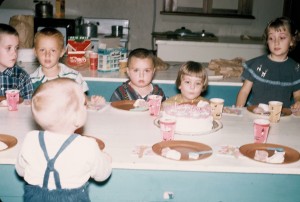
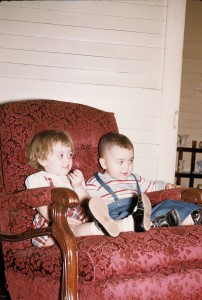
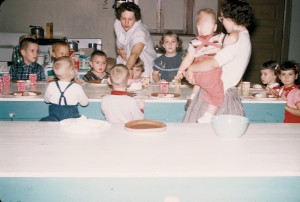
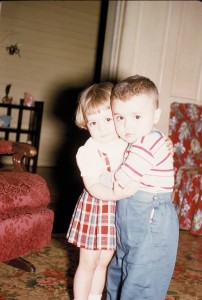
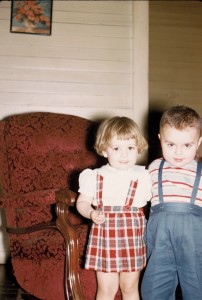

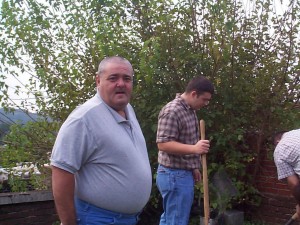
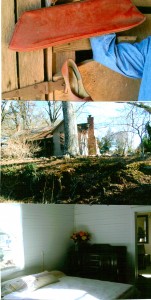
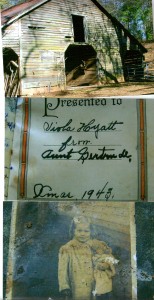
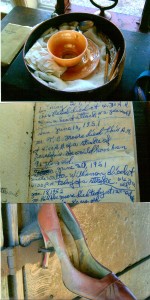
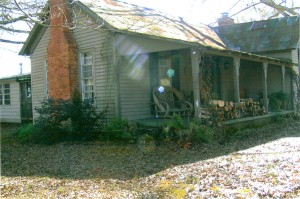
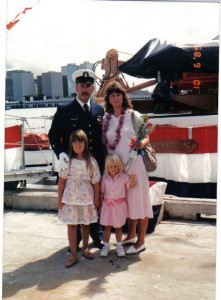
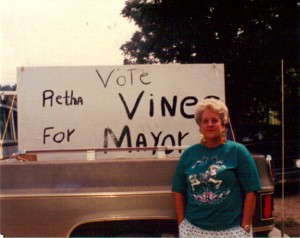
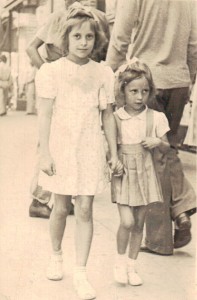
Comments